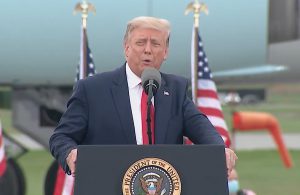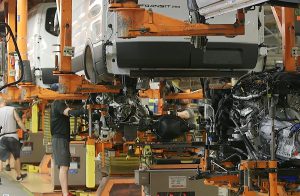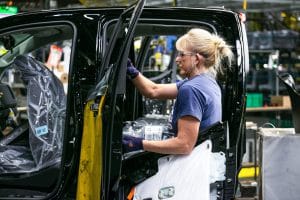
GM Chairman and CEO Mary Barra was one of dozens of Michigan-based business leaders who signed a statement about voting rights.
Dozens of Michigan-based companies, including industry giants General Motors and Ford Motor Co., issued a strongly worded statement Tuesday objecting to Republican-sponsored bills that would make it more difficult to vote in Michigan and other states.
This marked the latest in a series of actions by some of the largest U.S. corporations to push back on GOP efforts to limit voting measures, such as mail-in ballots and access to ballot drop boxes, in the wake of former President Donald Trump’s defeat last November.
“Government must support equitable access to the ballot to ensure that all eligible voters can exercise their rights,” declared the statement issued by three-dozen Michigan companies. “Government must avoid actions that reduce participation in elections — particularly among historically disenfranchised communities, persons with disabilities, older adults, racial minorities and low-income voters.”
45 states target voting rights

Jim Farley, Ford CEO, says ensuring “equitable access to voting” is critical to the long-term success of a free society.
After losing the presidential election, Trump declared the vote had been “stolen,” a claim universally rejected by election officials and the courts. But it has riled up hardcore supporters — like those who staged an attack on the U.S. Capitol on Jan. 6, as well as Republican legislators who have introduced bills aimed at restricting voter access in 45 states.
A bill has already passed in Georgia containing numerous restrictions that even prohibit providing bottles of water to those waiting on line to vote. The new law’s language has been widely criticized as targeting the racial minorities who helped Democrats regain control of the U.S. Senate by voting in the state’s two Democratic senators.
Michigan is one of the states now moving forward with proposed legislation that would, among other things require a voter to attach a photocopy of a government ID when returning a mail-in ballot. It also would ban communities from issuing prepaid return ballot envelopes. The GOP-controlled Michigan Senate is preparing to hold hearings on the measure this month.
Business backlash
That has triggered a strong backlash among Michigan’s traditional GOP-leaning business community. Among the organizations that co-signed the statement Tuesday are the leaders of GM, Ford and Stellantis — the company formed this year by the merger of Fiat Chrysler Automobiles and PSA Group. All four of the major Detroit-based sports teams signed the statement, as did various banks, utilities and other businesses.

Stellantis’ Mike Manley also lent his name to the letter calling for improved voting access.
Mary Barra, the GM CEO, issued an additional statement saying that, “we want to reiterate our belief that the right to vote is the essence of a democratic society and that the voice of every voter should be heard in elections that are conducted with integrity. Last year, we said we would leverage our voice to drive inclusion. Therefore, we are calling on Michigan lawmakers and state legislatures across the nation to ensure that any changes to voting laws result in protecting and enhancing the most precious element of democracy — the right for all eligible voters to have their voices included in a fair, free, and equitable manner.”
The 2020 election saw record voter turnout in much of the country, especially among blacks and other minorities that traditionally have turned out in lower numbers than whites. Michigan saw 5.5 million people go to the polls in November, a record in terms of raw numbers, as well as the highest percentage of the voting-age electorate in 60 years.
Senate leader under fire
The Senate measure in Michigan is being overseen by Majority Leader Mike Shirkey, a Republican who has himself come under fire for comments made on several occasions since Trump was defeated — the then-president losing to Joe Biden after winning in Michigan in 2016.

President Donald Trump repeatedly claimed the 2020 election was stolen from him.
In February, a recording surfaced revealing that Shirkey told a gathering of Republicans that the Jan. 6 attack was a “hoax,” and had been “staged.” Shirkey said Tuesday the proposed state ballot bill would ensure that every vote will be “handled and counted the same.” He contended that the measure is a “perfunctory step to equitable access.”
The statement issued by Michigan business leaders on Tuesday did not specify what, if any, actions they might take if the bill were approved. Major businesses have taken more direct action in response to the passage and signing of the Georgia law, however.
A nation polarized
Major state businesses, including Delta Airlines and Coca-Cola spoke out harshly. Some have indicated they will consider shifting resources out of the state. Major League Baseball moved the annual All-Star Game to Colorado. And some film and TV projects have been relocated, as well.
The debate about voting rights comes at a time when the nation is as polarized as ever. The majority of Republicans believe the 2020 election was “stolen,” according to numerous polls, even though many major GOP leaders have dismissed such claims.

President Joe Biden took office in January despite claims of voter fraud.
One of the more significant developments has been a shift by many major corporations, a number of which have pulled back on political donations, especially to GOP campaigns.
Protecting the “historically disenfranchised”
In comments to company employees last week, Ford CEO Jim Farley stressed that the company “believes that equitable access to voting rights for all people is the bedrock of a democratic society.”
Echoing widespread concerns that proposed voter restrictions are aimed at minorities, Farley added, “We’re also aware that the right to vote in a free and fair election has been hard won in our nation, particularly for groups that have been historically disenfranchised. That’s why we support initiatives that promote equitable access and do not disproportionately affect any segment of the population.”














